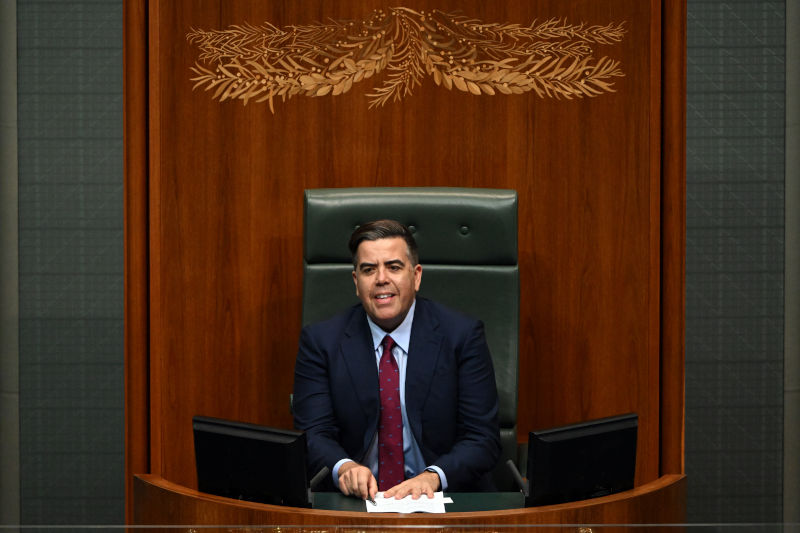Will Speaker Milton Dick really control MPs' conduct?
July 27, 2022
Ministers will set the tone and it is unlikely that the new Speaker, Labors Milton Dick, will do much to impose himself on them.
Anthony Albaneses aim to bring decency back into politics would have been greatly progressed had Labor not won a majority in its own right in the House of Representatives.
Being in a minority would have meant Labor would have been forced to agree to the appointment of an independent Speaker in the House of Representatives. In all likelihood it would have been Andrew Wilkie, the member for Clark (formerly Denison) in Tasmania for 12 years, former army officer, senior analyst in the Office of National Assessments, and whistleblower.
Wilkies electorate was frequently (though not invariably) held by whichever party was in government. He has turned it into a very safe seat for himself as an independent. That would have provided him with the security that a Speaker needs if he or she is going to be able to enforce the standing orders fairly (to all MPs) and to resist government attempts to dictate proceedings.
It is extremely rare for a Speaker appointed from the ranks of the Government to bring to his or her job the independence that, in theory at least, it demands. It takes courage for a member of the government party to make rulings that disadvantage the government, even though that is what the standing orders might dictate. It takes great fortitude to tell the Prime Minister to resume his seat, when the Prime Minister has ignored and disregarded such a ruling.
Very occasionally there is such a Speaker. Tony Smith, a recently retired Liberal MP, was the best in recent memory. Normally, however, Speakers are chosen by their party and its leader because they are thought to be safe, ready and willing to help the government manage proceedings to the advantage of the government.
More often than not, that means several dozen Opposition MPs will be removed from the House for disorderly conduct for every government MPs that is so disciplined. And that irrespective of the merits.
Its very different in Britain, in the House of Commons, from where traditionally and in theory, our parliamentary system is derived. There, once a Speaker is elected, he or she divorces themselves from the hurley-burley of party politics (in very comfortable quarters inside the Palace of Westminster) until they decide to retire, their independence guaranteed by the major parties agreeing not to oppose their re-election from their constituency while they retain their high office.
In Australia the Speakership has always been regarded as just another perk of office, usually awarded to someone who for whatever reason is considered not to be up to holding ministerial office or who gets it as a reward for stepping aside from a previous post.
It is a job for one of the boys or girls, one of the additional salaries available for sharing among members of the government. Backbenchers in particular dont like the idea that such a perk should be given to someone outside their own ranks.
But the Speakers job is one that really matters. How it is performed can influence and help determine Parliaments reputation with the voting public. (The House is of course only half of the Parliament, but what happens in the Senate is rarely reported though when it comes to committee work the Senate out-performs the House.)
And the new Prime Minister seems to be genuinely concerned about behaviour and decorum and civility in parliament. There can be little doubt that one of the reasons parliament and politicians are held in such low esteem by the public is because of the way MPs conduct themselves during question time in particular, like out-of-control school-children rather than adults responsible for the political welfare of the nation.
Many commentators blame the use of Dorothy Dixers the questions asked by government backbenchers that are intended simply to provide ministers with the opportunity to spend 5 minutes lambasting and often misrepresenting the supposed foibles of the Opposition.
Dorothy Dixers are not going to disappear, however, as Tony Burke, the governments new Leader of the House, explained on the ABCs Insiders program last Sunday. Rather, it seems, they will be used by Ministers to detail and explain government policy. If that were to be so, they would certainly be less objectionable than they have become. It will be interesting, however, to see to what extent ministers will follow the good behaviour doctrine.
Ministers will set the tone and it is unlikely that the new Speaker, Labors Milton Dick, will do much to impose himself on them. Mr Dick is a former state secretary (in Queensland) of the ALP and served several terms, including as Opposition Leader, in the Brisbane City Council. He is attuned to seeking partisan advantage for his party.
He will need to exhibit quite different skills and abandon the habits of his political lifetime if as Speaker he is to aid the Prime Minister in bringing more decency into the conduct of the Parliament. But he started well, promising when he took the chair for the first time, that he would not be attending the weekly Labor caucus meetings, that he would be impartial and that he would work with all members of the House.

